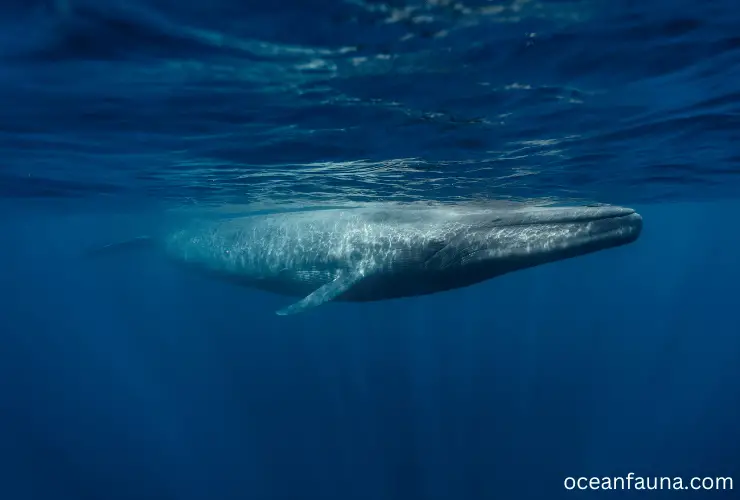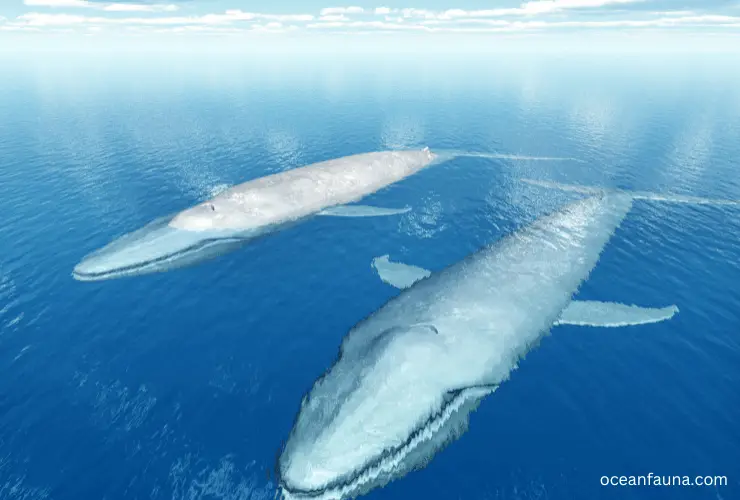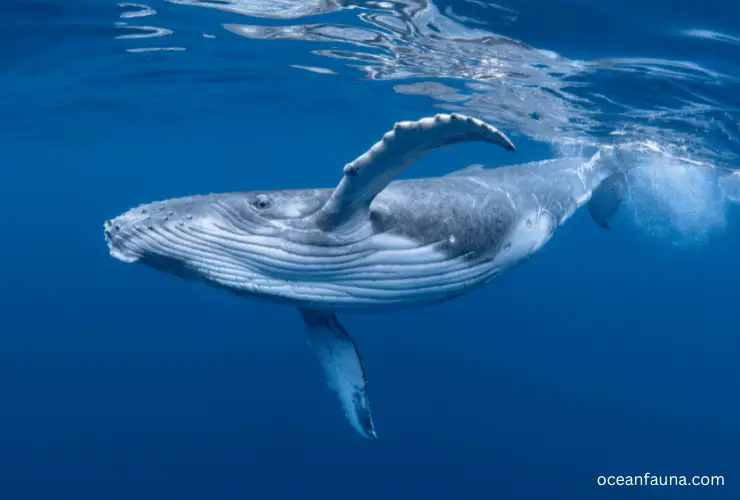Are whales mammals or fish? In short, whales are marine mammals, not fish. They are mammals along with dolphins, porpoises, sea lions, and others.
While many ocean creatures, such as sharks, are classified as fish, it’s natural to wonder why whales are mammals instead. The answer lies in their evolutionary history and anatomical adaptations.
In this blog post, I will discuss in detail why whales are mammals and some of the unique characteristics that set them apart from fish.
Evolutionary History of Whales: A Journey from Land Mammals to Marine Mammals

The story of whale evolution is both interesting and complex. It covers millions of years. It includes many changes for living in water. Whales are a diverse group of mammals with 89 other species (a total 90). These range from the huge blue whale to the small harbor porpoise.
Whales came from early artiodactyls. These were land mammals with hooves. They could run well but also had features for water life. They first appeared around 50 million years ago, before the dinosaurs and humans.
You can split whale evolution into four main parts.
- First, early artiodactyls started living part-time in water.
- Then, primitive whales like archaeocetes appeared. They still had legs for walking on land.
- Next came the fully aquatic basilosaurids and dorudontids. They lost their hind legs and grew flippers and tails.
- Lastly, modern whales evolved into toothed and baleen types.
Moving from land to water, whales had to adapt. These changes helped them live and reproduce in the sea. Key changes happened in their bones, breathing, senses, and reproduction.
For example, their bones became streamlined for swimming. Their lungs stored more oxygen for diving. Their senses of hearing and echolocation improved.
It shows that natural selection and adaptation can greatly change body shape and behavior. It also shows how life on earth is connected. Even different groups like artiodactyls and whales have common ancestors.
Lastly, it points out the key role of whales in oceans. It shows why we must protect them from hunting, pollution, and climate change.
Why Are Whales Mammals?

Why are whales classified as mammals? Whales are mammals, and here’s why, broken down into simple, key points.
Inner Ear Bones and Hair
- Whales have three middle ear bones – the stapes, malleus, and incus. That’s actually one of the reasons why they’re considered mammals. In addition, their ears are housed in two big, bulbous bones made of strong, porcelain-like material.
- Whale fetuses grow a type of hair called lanugo. However, this is a sensory hair and not all whales retain them throughout their lives.
Mammary Glands and Lactation
- Unlike fish, whales have mammary glands and can lactate.
- Like other mammals, female whales produce milk. They feed this to their young.
- This extended lactation gives whale calves vital nutrients for growth.
Warm-bloodedness
- Whales are warm-blooded. They keep their body temperature steady, no matter the environment.
- In contrast, fish are cold-blooded and depend on their surroundings for temperature control.
Breathing Air with Lungs
- Whales breathe air using lungs, unlike fish, which use gills.
- On average, they can hold their breath for up to 60 minutes underwater, though this varies by species.
Why Whales Are Not Fish?

Whales live underwater, but they are not fish. Here are the key differences explained simply.
Anatomical Adaptations
- Whales have streamlined bodies, flippers, and a dorsal fin. These help them move in the water.
- Fish have elongated bodies with scales and fins. They move efficiently in water. Fish breathe with gills, unlike whales with lungs.
Warm-blooded vs. Cold-blooded
- Fish are cold-blooded. They depend on their surroundings for body heat.
- Whales are warm-blooded. They control their body temperature internally.
Reproductive Systems
- Whales reproduce with internal fertilization.
- Fish usually reproduce externally. They release eggs and sperm into the water.
- Male whales use a ‘clasper’ organ to transfer sperm to females.
Breathing Technique
- Whales need to come up for air.
- Fish can stay underwater longer because they get oxygen from water.
Intelligence
- Whales are much smarter than fish.
- They have large brains for their body size. This makes them intelligent and social.
Below is a table including more differences between whale and fish.
Whale Vs Fish
Here’s a table that highlights the differences between whales and fish, organized into three columns: the differentiating factors, characteristics of whales, and characteristics of fish.
| Differentiator Factors | Whales | Fish |
| Classification | Marine Mammals | Aquatic vertebrates (not mammals) |
| Breathing | Breathe air through lungs | Breathe underwater using gills |
| Body Temperature Regulation | Warm-blooded (maintain constant body temperature) | Cold-blooded (body temperature changes with environment) |
| Reproduction | Give birth to live young | Lay eggs |
| Body Structure | Smooth skin with some hair, fins have bones | Scales covering body, fins without bones |
| Nursing | Nurse their young with milk | Do not nurse; young are often independent from birth |
| Sound Production | Use vocal cords to produce sounds | Produce sounds using various methods but not vocal cords |
| Sleeping Habits | Sleep with part of their brain active to control breathing | Most fish do not have eyelids and don’t sleep like mammals |
These differences highlight the distinct biological and physiological characteristics of whales and fish, emphasizing how whales are indeed mammals adapted to marine life, while fish are a diverse group of aquatic vertebrates.
FAQs
Are All Whales Mammals?
When I was writing this blog, I found some questions.
- Are sperm whales mammals?
- Are humpback whales mammals?
- Are blue whales mammals?
- Are beluga whales mammals?
I have one answer for all these questions: “Yes, all the whales are mammals.”
Are whales the smartest mammals?
No. Whales are not the smartest.
Humans are the most intelligent mammals; nearby, dolphins rank as the second smartest. On the other hand, whales claim the respectable third position in the intelligence hierarchy among mammals.
Do whales have lungs?
Yes, whales have lungs, although their respiratory system differs from ours. Rather than having just two lungs, they possess a network of interconnected air sacs. This unique adaptation enables them to take in substantial amounts of air and gradually release it.
Consequently, they can remain submerged for extensive durations without resurfacing for breath.
Is the blue whale the largest mammal?
Blue whales are the largest mammal species, but not a normal one. Instead, the Antarctic blue whale claims the title of the world’s largest mammal.
Weighing an astounding 400,000 pounds (equivalent to approximately 33 elephants) and stretching up to 98 feet in length, the Antarctic blue whale, scientifically known as Balaenoptera musculus ssp. Intermedia reigns as the largest animal on our planet.
Are whales the largest mammals?
Not all whales are the largest. While some whale species, such as the blue whale (a baleen whale), are indeed the biggest mammals on earth, other species, like the beluga whale, are relatively small.
Are Whale Sharks mammals or fish?
Whale sharks are fish, not mammals. They got whales in their name because of their size and filter-feeding method, like baleen whales. But unlike whales, they belong to the shark family, having gills, scales, and cartilage instead of bones.
Fun fact: While the blue whale is the largest mammal, the whale shark takes the crown for being the biggest fish!
Conclusion
Whales are mammals, not fish. They possess several distinguishing features from fish, including warm-bloodedness, the need to breathe air with lungs, and internal fertilization.
As a result, they have adapted to life in water through unique anatomical features such as streamlined bodies, flippers, and a dorsal fin. Despite their aquatic lifestyle, whales remain one of the most intelligent mammal species on earth.
To learn more about these gentle marine giants, you may read my other blogs on whales or keep your questions in the comment section.

